Trainees

Magdalena Argomaniz
2024-present, Infectious Diseases
Mentor: Chet Joyner
Magdalena Argomaniz received her Bachelor’s degree in Biology from Idaho State University in 2019. She studied B cell differentiation during undergrad in response to asbestos fiber exposure. To further her research experience, she attended the UGA as a NIH Prep Scholar and did a year of research in Dr. Joyner’s lab. During that year she worked on characterizing the antibody response of Aotus nancymaae infected with P. vivax Brazil VII and defining the conditions required for transmission of culture-adapted P. cynomolgi. After enjoying her year in the Joyner lab, she decided to join the lab as a PhD student in the fall of 2021. Her current research focuses on developing genetic techniques to study the molecular basis for liver stage dormancy in P. vivax.

Fiifi Dadzie
2024-present, Genetics
Mentor: Jessica Kissinger
Fiifi A. Dadzie earned his Bachelor of Science in Agriculture from the University of Science and Technology in Ghana. He continued his academic journey with a Master of Science in Biology at Valdosta State University, GA, where he focused on developing innovative sequencing techniques for the ION Torrent PGM platform. This work sparked his passion for genomics and cryptic organisms, motivating him to pursue a PhD in Genetics at UGA.
Fiifi is currently conducting his doctoral research under the mentorship of Dr. Jessica Kissinger and Dr. Travis Glenn from the Department of Genetics and Bioinformatics. His research explores the genomic diversity of Cryptosporidium species, a project that has already resulted in two publications. As he progresses in his studies, Fiifi is committed to making further impactful contributions to the field. This fellowship enables him to continue advancing his research in Cryptosporidium genomics while also expanding his knowledge in related disciplines through conferences and collaborative networking. His goal is to emerge as a well-rounded scientist.
Beyond his research, Fiifi is passionate about effective communication and education. He strives not only to excel as a researcher but also to inspire and educate future scientists. His ambition is to combine his research expertise with teaching, creating a lasting impact on the scientific and academic communities.
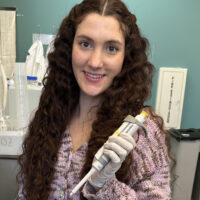
Cierra Gladfelter
2024-present, Genetics
Mentor: Tania Rozario
Cierra received her bachelor’s degree in Biochemistry from Colorado School of Mines in 2021. She worked in two chemistry labs focused on designing novel antibiotics targeted towards Gram-positive bacilli bacteria and synthesizing mesoporous silica nanoparticles for drug delivery. After graduation, Cierra was accepted into the PREP@UGA program and worked in Dennis Kyle lab. She investigated Plasmodium falciparum samples in search of resistance-conferring polymorphisms that may have evolved before the widespread use of anti-malarial drugs. After her prep scholar experience, she was accepted into to the PhD Genetics program in 2022 and joined the Rozario lab where she is working towards molecularly characterizing the progression of germ cell development in the rat tapeworm, Hymenolepis diminuta. This will help uncover the genes necessary for reproduction and parasite growth, providing a starting point towards designing novel anthelmintic drugs to combat parasitic flatworm infections. After obtaining her PhD, she wants to transition to a research-intensive career in industry that is genetics or parasitology focused.
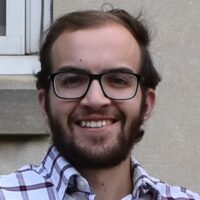
Derek Huck
2023-present, Entomology
Mentor: Michael Strand
Derek received a bachelor’s degree in Evolution and Ecology from Ohio State University in 2020. During this time, he completed a course in parasitology which spurred an interest in mosquitoes and other arthropod vectors. He also studied the relationship between nutrition and reproductive physiology in male mosquitoes in the lab of Dr. Megan Meuti as an undergraduate at OSU. This experience was impactful and inspired him to pursue a graduate degree in vector biology. He then began a PhD in Entomology at UGA under Dr. Michael Strand, where his research focuses on interactions between mosquitoes and microbes like bacteria. He is particularly interested in how microbes influence key processes in mosquitoes including development and pathogen transmission. He has served as both secretary and president for the H.O. Lund Entomology Club.
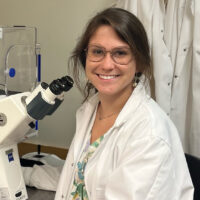
Victoria Mendiola
2023-present, Infectious Diseases
Mentor: Dennis Kyle
Tori is a PhD candidate and her interest is in tropical parasitic diseases and integrative biology. Her interest in tropical parasitic diseases stems from an undergraduate NSF REU where she was first introduced to hookworm persistence and a unique immune response in South American Fur Seals in the Gottdenker Lab at UGA. After graduating with a Bachelor’s in Biology from Kennesaw State University, she was accepted to the NIH Bridges to the Doctorate program at Kennesaw State University where she obtained a Master’s of Integrative Biology. Her present research aims to develop high throughput methods to visualize, enumerate and phenotype Artemisinin-induced dormant Plasmodium falciparum using high-content imaging. Her long-term career goal is to utilize her diverse training in physiology, developmental and cellular biology, and infectious diseases to design, optimize and implement phenotypic assays for drug discovery and disruption of parasite homeostasis.

Kaelynn Parker
2023-present, Pharmaceutical & Biomedical Sciences
Mentor: Diego Huet
Kaelynn received her Bachelor’s degree in Biology from the University of Mary Washington in 2021. There she worked with CTEGD alum, Dr. Swati Agrawal, which is where her passion for parasitology was first sparked. Under Dr. Agrawal’s guidance she worked on adapting CRISPR/Cas9 for Crithidia fasciculata for use as a model organism to study pathogenic kinetoplastids. This experience inspired her to attend UGA specifically to join a CTEGD laboratory. She was accepted to the Cellular Biology PhD program in 2021 and joined the Huet lab, where she works on mitochondrial dynamics and interorganellar communication in Toxoplasma gondii.
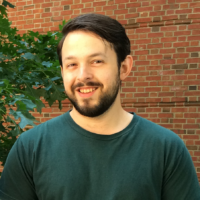
Dr. Corey Rennolds
2023-present
Mentor: Tania Rozario
Corey received his Ph.D. in biological sciences in 2022 from the University of Maryland, College Park, working in the laboratory of Dr. Alexa Bely. For his dissertation, Corey studied aspects of injury and whole-body regeneration in the annelid Pristina leidyi, including metabolic physiology, transcriptomics, and resource allocation patterns. Corey then joined the lab of Dr. Tania Rozario at UGA and was later awarded a T32 postdoctoral fellowship from CTEGD beginning in September 2023. Corey’s postdoctoral research under Dr. Rozario’s mentorship is aimed at characterizing stem cell populations in the rat tapeworm, Hymenolepis diminuta, including their molecular identities, plasticity, and functional contributions to growth and regeneration. Corey hopes that this fellowship will allow him to strengthen his technical and professional skills to pursue an independent and integrative research program focused on regeneration and other developmental processes in a variety of organisms, including parasites.
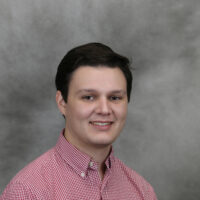
Clyde Schmidt
2023-present, Cellular Biology
Mentor: Sam Kurup
Clyde received his bachelor’s degree in Biochemistry and Molecular Biology from the University of Georgia in 2020. During his time as an undergraduate, Clyde had experience studying intracellular bacteria and host-pathogen interactions with Dr. Ankita Garg. His work with studying how Mycobacterium bovis BCG manipulated host cell macrophages inspired him to further expand his field of study to mechanisms of combatting intracellular pathogens. During his rotations through UGA’s Integrated Life Sciences Program, his interest in studying parasite-host interactions sparked following his time in Dr. Kurup’s lab. After joining in 2022, Clyde began his work on understanding how to better improve vaccines for liver-stage malaria and the relationship between parasite development and providing a suitable target for CD8 T cells.
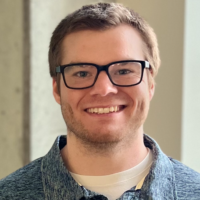
Dr. Mackenzie Sievert
2024-present
Mentor: Dennis Kyle
Mac began pursuing his interests in genetics as an undergrad at the University of Missouri-Kansas City where he gained research experience in the laboratory of Dr. Scott Hawley at the Stowers Institute for Medical Research. Mac contributed to projects aimed to identify the crucial genes and molecular mechanisms underlying meiosis using Drosophila melanogaster as a model system. After receiving his Bachelor of Science in Biology he went on to the University of Notre Dame where he earned a doctorate in Integrated Biomedical Sciences as part of the Bioinformatics and Computational Biology research cluster. During his graduate research in the laboratory of Dr. Michael Ferdig, he studied the genetics of drug resistance in the malaria parasite, Plasmodium falciparum. His dissertation used genetic crosses between recent clinical isolates and Quantitative Trait Loci mapping to identify genetic determinants that influence susceptibility to front-line antimalarial drugs. These data were integrated with fitness and gene expression phenotypes to examine the scope of genetic variants crucial for the evolution of drug resistance. The skills learned at Notre Dame led Mac to a postdoc position under the mentorship of Dr. Dennis Kyle. His research in the Kyle lab aims to identify the genetic factors that influence susceptibility to infection with the brain eating amoeba, Neglaria fowleri. This project relies on the Collaborative Cross mice made available by the National Institute of Health as well as collaboration with fellow members of the Kyle lab. The skills gained as a T32 postdoctoral fellow in the CTEGD will prepare him for an independent academic research career.
